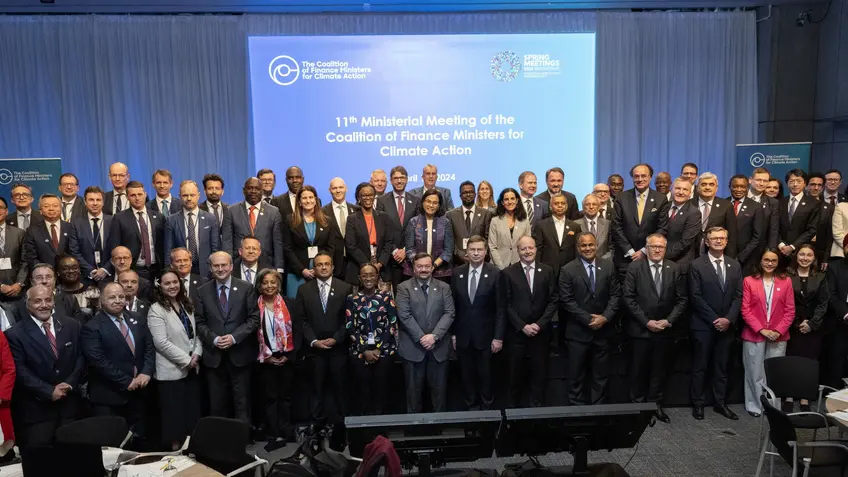Global Leaders Call for Stronger Engagement from Ministries of Finance to Raise Climate Ambition and Accelerate Climate Action
Washington D.C., United States, 17 April 2024 – In a vital push for climate action, global finance and environmental leaders alongside the United Nations issued a Call to Action today to strengthen the engagement of Ministries of Finance in developing, implementing and financing new national climate plans, or Nationally Determined Contributions (NDCs), due in 2025.
Marking the five-year anniversary of the Coalition of Finance Ministers for Climate Action, the Call to Action emphasizes that Finance Ministries hold the keys to unlocking the transformative potential of new national climate plans. With support from Finance Ministries, new national climate plans can be investable plans that safeguard and improve the livelihoods of people, families and local communities across the board.
Minister of Finance of Indonesia and Co-Chair of the Coalition of Finance Ministers for Climate Action, Sri Mulyani Indrawati said: “Ministries of Finance have a critical role to play in ensuring that Nationally Determined Contributions (NDCs) incorporate a broad set of economic considerations and advance socioeconomic well-being. However, 73% of coalition Finance Ministries are not currently involved in development of their country's NDCs. Therefore, we have convened today in Washington DC for the 11th Ministerial Meeting of the Coalition of Finance Ministers for Climate Action to advance the involvement of Ministries of Finance in the design and implementation of NDCs.”
NDC Partnership Co-Chair and Minister of Development Cooperation and Global Climate Policy of the Kingdom of Denmark Dan Jørgensen said: “NDCs are crucial to enhancing climate resilience and helping the citizens of countries around the world adapt to the worst effects of climate change. Strong engagement by the Ministries of Finance, and the collaboration between the Coalition of Finance Ministers and the NDC Partnership, which Denmark and Rwanda are co-chairing, is instrumental in the formulation and execution of ambitious NDCs aligned with national development priorities.”
The Co-Chair of the Coalition of Finance Ministers for Climate Action Minister of Finance of the Netherlands Steven van Weyenberg added: “We have no time to spare when it comes to taking climate action. It is imperative that Finance Ministries actively contribute to developing and financing NDCs. For future generations, the social, environmental, and financial cost of delayed inaction will far outweigh the costs of bold actions required today.”
NDC Partnership Co-Chair and Minister of Environment of the Republic of Rwanda Dr. Jeanne d'Arc Mujawamariya said: “Today’s Call to Action highlights the urgent need to involve Ministries of Finance in the development and implementation of NDCs that reaffirm the spirit of the Paris Agreement. As a Co-Chair of the NDC Partnership, we stand committed to strengthening the engagement of Ministries of Finance in all aspects of NDC development and implementation to ensure that we respond to the outcomes of the Global Stocktake with the urgency this moment requires.”
The Danish Minister of Finance Nicolai Wammen said: “Ministers of Finance need to step up and lead on climate action. The green transition requires historic investments and major structural changes to the economy. We need strong cooperation within governments on planning and implementation of the NDC’s. Otherwise we will not reach the finish line.”
The Call to Action is rooted in the urgent findings of the 2023 Global Stocktake, which warns that the world is significantly off track in meeting the goals of the Paris Agreement and urgent action is needed to combat the growing threats posed by climate change. According to the Call to Action, through the submission of new NDCs to the United Nations Framework Convention on Climate Change (UNFCCC) in 2025, countries now have the opportunity to ‘turn the tide of the climate crisis’.
Launched at the 11th Ministerial Meeting of the Coalition hosted by the World Bank and the International Monetary Fund, the Joint Call to Action is presented by both the Co-Chairs of the Coalition of Finance Ministers for Climate Action and the NDC Partnership, alongside the United Nations Framework Convention on Climate Change and United Nations Development Programme.
To learn more, read the full Joint Call to Action here.
For Media Inquiries:
NDC Partnership Communications Manager, Caity Pinkard: caitlin.pinkard@ndcpartnership.org
About the Coalition for Finance Ministers for Climate Action
The Coalition of Finance Ministers for Climate Action was created in 2019 and now has 92 members, including all the G7 countries, and 27 Institutional Partners. It brings together economic, fiscal and financial economic policymakers in leading the global climate response and in securing a just transition towards low-carbon resilient development. Together, the Coalition accounts for 40% of global CO2 emissions and a substantial 70% of global GDP. All members of the Coalition have committed to the six foundational Helsinki Principles, which require national action on climate change, particularly through fiscal and financial policies. The Coalition is currently co-chaired by the finance ministers of the Netherlands and Indonesia, the initiators of this call to action.
About the NDC Partnership
The NDC Partnership is a global coalition, bringing together more than 200 members, including more than 120 countries, developed and developing, and nearly 100 institutions to deliver on ambitious climate action that helps achieve the Paris Agreement and drive sustainable development. Governments identify their NDC implementation priorities and the type of support that is needed to translate them into actionable policies and programs. Based on these requests, the membership offers a tailored package of expertise, technical assistance, and funding. This collaborative response provides developing countries with efficient access to a wide range of resources to adapt to and mitigate climate change and foster more equitable and sustainable development.
